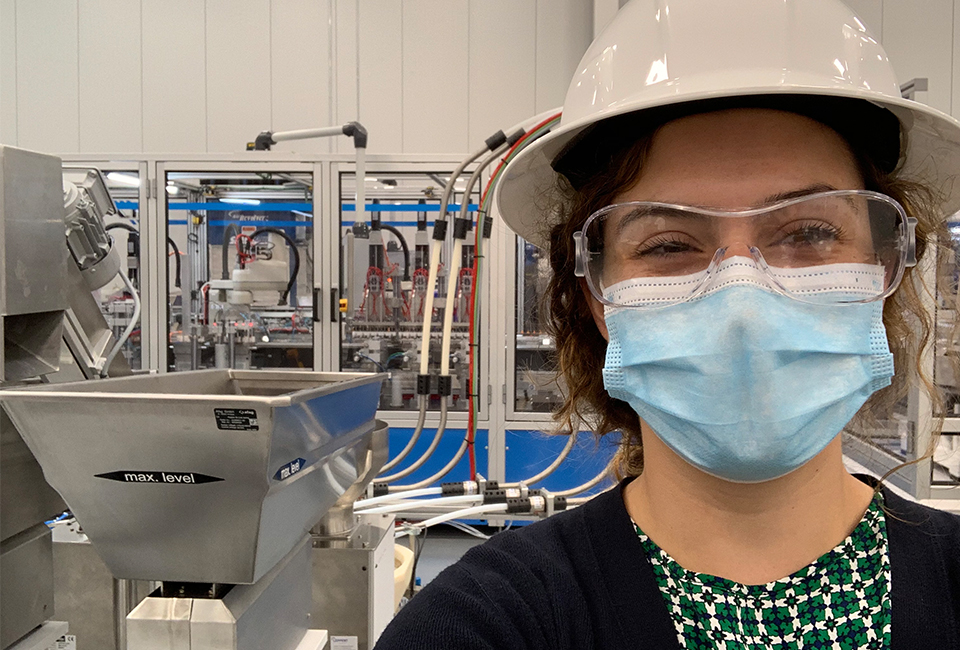
Engineering in healthcare: from intern to engineer
For young engineers, Abbott offers unique career opportunities.
Feb. 18, 2021
- Copy Link
- Share on X
- Share on Facebook
- Share on Linkedin
Careers in STEM are expected to grow by 13% between 2017 and 2027, according to the Education Commission of the States. Due to this growth, a popular field for people with a STEM background is healthcare.
Advances in healthcare require not only scientists and researchers, but engineers who can turn concepts into products and devices that save and improve the quality of people's lives. Entry-level engineer jobs in healthcare offer young professionals a wide variety of opportunities and flexible career paths that all lead toward one destination — helping people now and in the future.
Nicole Joison, a manufacturing engineer for Abbott's rapid diagnostics business shares her career journey.
How an internship turned into a career
Prior to becoming a full-time manufacturing engineer, Joison worked as a summer engineering intern for Abbott's molecular diagnostics team. After earning a bachelor's degree in biomedical engineering, she applied and was accepted into the Professional Development Program (PDP), an experience she credits with expanding her skill sets and horizons.
"I was able to move around within supply chain and operations and manufacturing supervision in several businesses," she says. "Not many people get to do that during their first three years at a company."
This diversity of experiences across an organization is invaluable. It gives an entry-level engineer perspective that goes beyond the skills and knowledge acquired at a college or university.
"My engineering degree provided the foundation and the principles for me to have technical conversations," she says. "But I think engineers are better at their jobs when they can understand the pain points of the commercial side of the business, such as marketing, logistics and the supply chain, in a more in-depth way."
To that end, Joison is currently pursuing an MBA with a concentration in operation management at the University of Chicago Booth School of Business.
A career in full motion
Today, Nicole is a manufacturing engineer who provides manufacturing and process engineering support for the capacity expansion of a molecular point-of-care platform for COVID-19, influenza A&B, strep A and respiratory syncytial virus testing.
She's part of an engineering team that supports a manufacturing site to design, validate and ramp up production of COVID-19 tests. With the help of her team, she reviews designs for building automation equipment to accelerate cycle time performance and plant capacity to meet the demand for tests.
After a machine goes into production, Joison and her engineering team collaborate with the quality and production teams. The engineers constantly analyze data from the production floor to continue to optimize production and ensure quality controls are maintained. Using leading-edge software and working directly with manufacturers to keep our production lines running smoothly.

Nicole on the production floor.
Improving lives and making a difference
One of the most gratifying aspects of working in healthcare for engineers, Nicole says, is knowing that what you're doing can have a major impact on people's lives.
"When you look at some of Abbott's neuromodulation products, vascular catheters and other devices that go into the body, engineers are able to make those a reality," she says. "That's very exciting to me."
Developing a product is one thing but being able to mass-produce it for a global market is an entirely different challenge. Here, too, engineers play an invaluable role.
"You need a deep knowledge of automation machinery and how to meet the quality standards we expect at Abbott. You also have to understand and comply with regulations in the United States and various countries around the world," Joison says. "Engineers are the ones who make that happen."
The COVID-19 pandemic has accelerated medical research initiatives, putting a bright spotlight on the healthcare industry and the need for frontline workers, vaccines, protective equipment and the ability to solve problems at scale. The demand for engineers in healthcare is on the rise, as are the opportunities.
"It makes you realize how precious life is and how easy it is to take that for granted," Joison says. "I don't think I'll ever work on a project in healthcare where I have to convince anyone to be motivated. The sense of urgency is real — and so are the rewards."
For the latest on Abbott’s life-changing technology, get updates directly in your inbox.